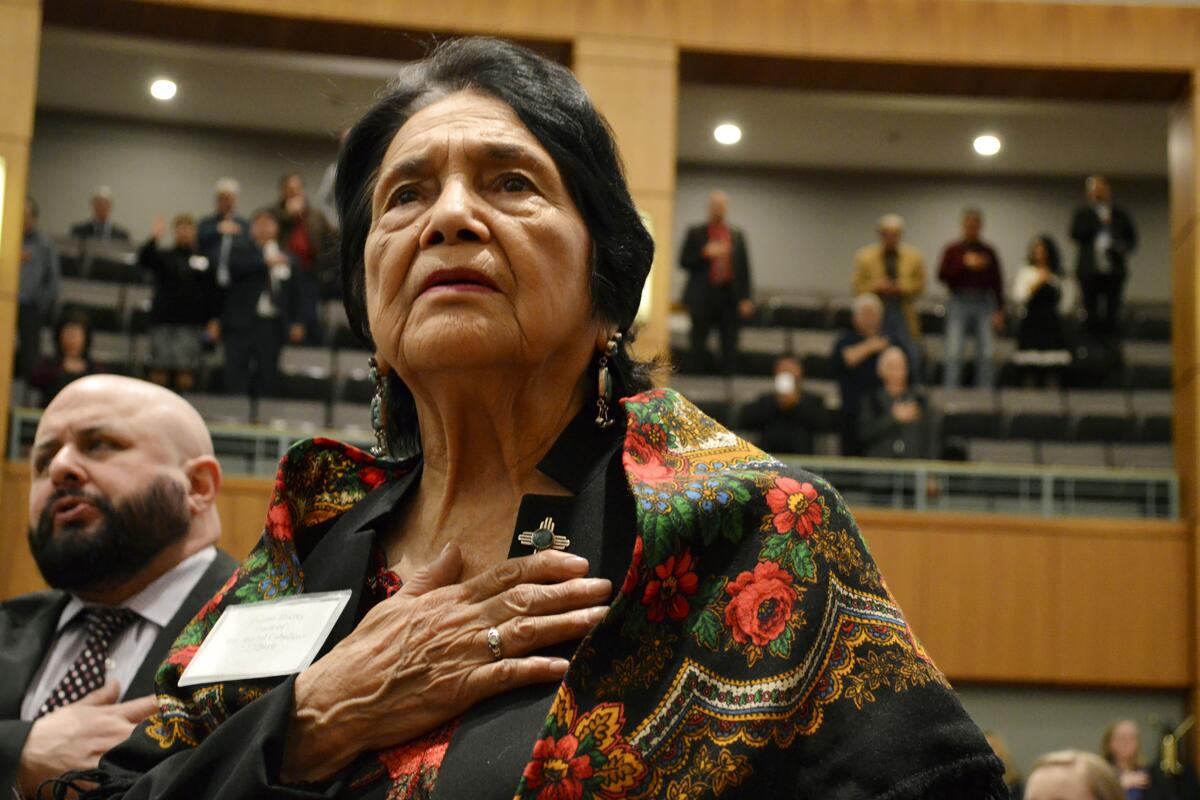Column: In a ‘Latinas First’ strategy, everyone wins

- Share via
The GOP has two words that give it strength: “America First.”
Putting aside the slogan’s antisemitic history and the problematic scarcity mind-set it promotes, it might sound reasonable enough. Why shouldn’t our elected officials put our country first?
But the phrase is a useful lie to mask the party’s actual priorities: protecting beloved tax-dodging billionaires and multinational corporations, which certainly are not putting America first.
Opinion Columnist
Jean Guerrero
Jean Guerrero is the author, most recently, of “Hatemonger: Stephen Miller, Donald Trump and the White Nationalist Agenda.”
Here’s a slogan-worthy strategy that actually would benefit the nation as a whole: “Latinas First.”
Latina leadership tends to have a ripple effect that helps broader communities, according to a new report by the USC Equity Research Institute in partnership with Hispanas Organized for Political Equality (HOPE), a nonprofit for Latina empowerment.
We’re not talking about innate racial differences between Latinas and others; such ideas are pseudoscience, despite what a rising number of Republicans seem to believe. Latina leaders tend to advocate for the greater good because they are more likely to have had “a lived experience of being working class, of experiencing economic hardship, of seeing exclusion,” USC sociologist and report co-author Manuel Pastor told me.
Latinas can identify as Black, Indigenous, white or mestiza. Many are mothers. Some are immigrants or daughters and granddaughters of immigrants. And they commonly fight for society’s most vulnerable.
Anything that elevates Latinas can be expected to elevate everyone around them too. But Latinos receive less than 2% of U.S. philanthropic dollars. “It is simply criminal that the level of investment in Latino leadership is so low when there is such a high yield for everyone,” Pastor said. The high yield is particularly true of Latinas, who naturalize and vote at a higher rate than Latinos. They’re the ones persuading men and others in their families to vote and be vaccinated.
Investing in Latinas has what Pastor calls a “multiplier effect” evidenced by the effectiveness of promotoras, or Latinas who go door to door to connect entire communities to healthcare and other services, including by translating public information to Spanish and Indigenous languages.
The case for investing in Latinas is especially clear in California, where Latinas are mothers to more than half of the state’s children, according to the report. They’re 39% of the state’s women and play the biggest role in shaping its young people. Putting California’s Latinas first means putting California’s families and future first.
We’ve already seen the transformative work that the state’s Latinas can do: from labor icon Dolores Huerta organizing farmworkers to believe “Sí se puede,” to L.A. County Supervisor Hilda Solis securing green spaces, toxin cleanups and affordable housing for long-neglected areas. Former Assemblymember Lorena Gonzalez fought to raise the minimum wage and is now shaking things up as head of the California Labor Federation. Many other Latina leaders are creating a statewide metamorphosis.
Gov. Gavin Newsom has recognized Latinas’ essential role for progress. On Wednesday, he nominated Justice Patricia Guerrero to be the California Supreme Court’s next chief justice — the court’s first Latina chief justice.
But improvements in public-sector representation for Latinas wouldn’t be happening without lobbying from fellow Latinas who’ve managed to break through. “That didn’t happen overnight or by mistake,” Hope’s CEO, Helen Iris Torres, told me. “That happened because we created an environment in which Latinas have opportunities to run for office.”
Latinas surveyed in the report spoke of solidarity as a key value. That’s why it’s important to replicate Latinas’ public-sector empowerment in the private sector, with more Latinas on corporate boards and commissions and in executive-level positions. Their success would reverberate. As the report states: “In a state that consistently ranks in the top five states in terms of income inequality, it is critical to have leaders who realize that their rise up the ranks requires that they extend a hand to others.”
But at all educational levels, Latinas earn less than non-Latinas despite their contributions. That’s in part because most don’t have access to the same networks of wealthy donors and mentors as white women. Organizations like HOPE’s Leadership Institute aim to close that gap.
Marce Gutiérrez-Graudiņš, a 40-year-old Latina mother from Tijuana who lives in Chula Vista, Calif., graduated from the institute in 2013. She’s the founder and executive director of Azul, a grassroots group that focuses on working with Latinos on ocean and coastal conservation.
Early in her career as an environmental justice advocate, she had a hard time seeing herself in certain government leadership roles.
“You can’t be what you can’t see,” she told me.
Gutiérrez-Graudiņš found herself surrounded mostly by white people and non-Spanish speakers in her field. After learning alongside other Latina leaders through HOPE, she gained more confidence and joined the California Coastal Conservancy’s board. She brought her perspective as a Latina to the campaign for the first statewide ban on single-use plastic bags, back when many people believed Latinos wouldn’t recycle.
She knew that wasn’t true from having watched her grandmother. “She had her own reusable bag, nothing fancy,” she told me. “But we do have a background of being judicious with natural resources.”
Last month, Azul released a poll showing that Spanish-speaking households are more progressive on environmental and climate issues than English-speaking households. When she’s not fighting to save the Earth, Gutiérrez-Graudiņš is shattering stereotypes. “I know I can’t fix everything, but I certainly want to try,” she said. “And I think that’s a community value: this collectivism and looking out for each other.”
When we put Latinas first, we’re putting the whole country first and making it the best it can be.
More to Read
A cure for the common opinion
Get thought-provoking perspectives with our weekly newsletter.
You may occasionally receive promotional content from the Los Angeles Times.












